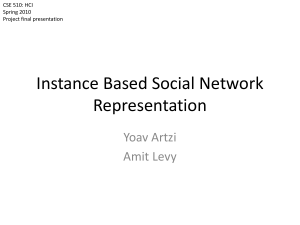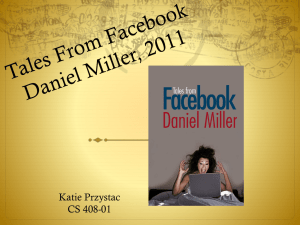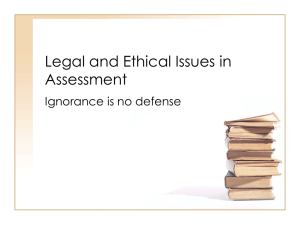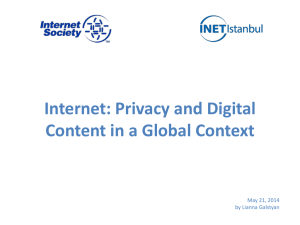Pay-Attention-to-Privacy-Or-Else
advertisement
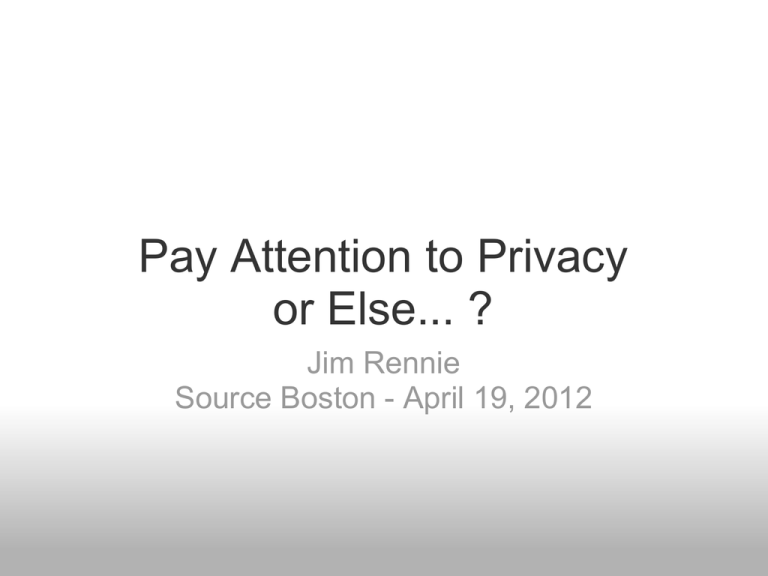
Pay Attention to Privacy or Else... ? Jim Rennie Source Boston - April 19, 2012 Bio Currently in Compliance at TRUSTe in San Francisco Advise and do gap reviews on US / EU privacy best practices 3 years of experience as a Public Defender in Las Vegas Graduate of Benjamin N. Cardozo School of Law, 2007 Prior to law, over 3 years of experience as a software developer Disclaimer Although I am a lawyer, I am not YOUR lawyer. This is not legal advice. We do not have an attorney-client relationship. Agenda What is privacy? Why should I care? What is the current state of privacy regulation in the US? Some recent FTC cases Future US privacy regulation A brief stop in the EU Questions Privacy What is Privacy? Privacy What is Privacy? An Individual’s ability to control Personally Identifiable Information about themselves. Privacy What is Privacy? An Individual’s ability to control Personally Identifiable Information about themselves. Privacy != Anonymity Privacy != Secrecy Privacy != Security Privacy v. Security Privacy v. Security In terms of practices / regulation today... Privacy today is like Security 15 years ago. Privacy Why should I pay attention? Privacy Why should I pay attention? 1. It's the right thing to do Privacy Why should I pay attention? 1. It's the right thing to do 2. Consumers like businesses they can trust Privacy Why should I pay attention? 1. It's the right thing to do 2. Consumers like businesses they can trust 3. If you don't, the FTC will show up Privacy Law in the US No constitutional right to privacy No general federal privacy law (yet) Sector-specific Privacy Laws: GLBA HIPAA COPPA Privacy Law in the US FTC (Federal Trade Commission) Protects consumers from business practices that are Unfair or Deceptive Less direct power than you might think Privacy Law in the US California Privacy Law Constitutional right to privacy Privacy Statement required for any internet service doing business in CA Recently expanded to include mobile apps Privacy Law in the US California Privacy Law You have to have a privacy statement + FTC Protects consumers if your privacy statement or practices are unfair / deceptive FTC v. Google Google Settles with FTC over Google Buzz rollout • Google's privacy policy said "if we use [your] information in a manner different than the purpose for which it was collected, then we will ask for your consent prior to such use..." • But user info was automatically used to populate Google Buzz without informing users or giving users a chance to say no. • Did not provide users enough information to make an informed choice. • Failed to follow US/EU SafeHarbor requirements FTC v. Google Google Settles with FTC over Google Buzz rollout • Fix the problems identified by FTC • 20 years of FTC oversight • Independent Privacy audits every other year • Possible fines for non-compliance FTC v. Facebook Facebook Settles because of... lots of stuff • Information that was private became public without informing users • Policy claimed Apps could only access information they needed to operate, but they could access almost anything • Setting data to "Friends Only" didn't prevent third-party Apps from accessing data • Content that was "deleted" was still available • Failed to follow US/EU Safeharbor requirements FTC v. Facebook Facebook Settles because of... lots of stuff • • • • Fix the problems identified by FTC 20 years of FTC oversight Independent Privacy audits every other year Possible fines for non-compliance FTC v. Chitika Chitika Settles because of faulty opt-out mechanism • Privacy policy said users could opt-out of tracking • Using the opt-out mechanism did drop an opt-out cookie and told the user they opted-out • But the cookie only lasted for 10 days (oops!) FTC v. Chitika Chitika Settles because of faulty opt-out mechanism • Required all opt-outs last for 5 years • Delete any consumer data obtained during period of malfunctioning opt-out • Possible fines for non-compliance FTC v. RockYou Rock You Settles because of Security and COPPA violations • Rockyou's privacy policy claimed they took adequate security measures to protect personal information • But in reality, they stored usernames / passwords in plain text • Not living up to security assurances is "deceptive" (consistent with prior FTC v. Twitter settlement) • COPPA violation for knowingly collecting information from users < 13 years old FTC v. RockYou Rock You Settles because of Security and COPPA violations • $250,000 fine • Fix the problems identified by FTC • 20 years of FTC oversight • Independent Privacy audits every other year • Possible higher fines for future violations Current State of Regulation Say you do / Do what you say Notify users before changing how you use their data Future: FTC FTC Final Recommendations for Business and Policymakers March 2012 Calls for Privacy by Design Simplify Choices for Consumers & Greater Transparency Do Not Track Mobile Data Brokers Large Platform Providers Promoting Enforceable Self-Regulation Future: White House White House Releases Blueprint for Consumer Privacy Bill of Rights February 2012 • • • • • • Transparency Respect for Context Security Access and Accuracy Focused Collection Accountability Briefly: The EU Constitutional right to privacy Much more privacy protective that US Policy set on EU level, enforcement by individual countries' Data Protection Agencies (DPAs) If you're transferring personal data out of the EU, and you're not: in the safe harbor / have model contracts / have binding corporate rules ... you're doing it wrong. Future: EU They're going to hit companies where it hurts... Draft Regulations: • More aggressive regulation • Ability for NGOs to sue DPAs if they fail to enforce • Huge fines for violations (up to % of yearly profits) Conclusion Privacy is important to consumers Say what you do / Do what you say FTC stepping up enforcement in privacy-related matters More Privacy regulation is coming (US and EU) Privacy by Design is the future Questions ???



